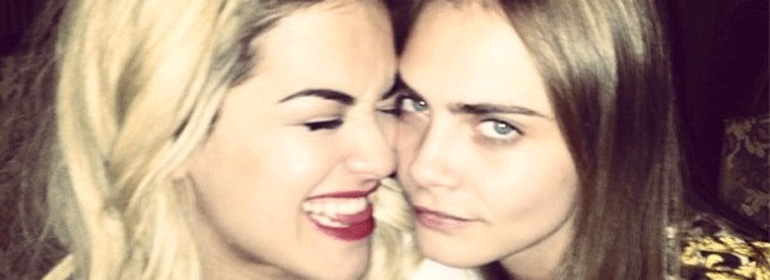When people jump on the bi-curious bandwagon, it’s detrimental to those who actually are bisexual, says Christine Allen.
‘Christine. 26. Bi-curious.’
I curse silently at the online dating profile I’ve just created. In my haste to download Dattch, the latest women’s dating app to hit our smartphones, I’ve selected the wrong sexual orientation. After a few moments of scouring the application’s interface I find what I am looking for. Within a few clicks, the B-word has been banished, replaced with ‘Lesbian’.
However later that night I can’t help but wonder what it was about accidentally labeling myself as ‘bi curious’ that got my girl boxers in such a twist?
The more I thought about it, the more I began to realise that I didn’t believe in it – bi-curiosity, that is. Do I believe that people can truly be attracted to both genders and therefore identify as bisexual? I do. And despite my misgivings about the term ‘bi-curious’, I can also see why its availability on a dating app could be viewed as appropriate. After all, such applications are renowned for facilitating hook-ups, and in turn, opportunities to explore one’s sexuality. What I don’t get, however, is this – how can ‘bi-curious ‘ be anything more than a short-term status or identity?
For the last three years I’ve known a girl who has consistently stated that she is bi-curious. At the risk of sounding harsh, aren’t people who continue to use to the ‘bi–curious’ label beyond a reasonable amount of time guilty of being greedy? And by availing of a portion of the word bisexual, aren’t they damaging the reputation of those who identify as bi?
Enough Prejudice
After all, as things stand, bisexuals don’t have it easy within the LGBT community. Often labeled as “attention-seekers” and wrongly criticised for being ‘on the fence’ – isn’t it fair to say that bisexuals have enough prejudice to deal with without being tied to those who refuse to make up their minds?
Now, don’t get me wrong, I understand that everyone’s timeline differs when it comes to figuring out one’s sexuality. However, with the Internet facilitating the visibility of LGBT people and therefore their whereabouts, is there any legitimacy to a person being uncertain about their sexual orientation for a lengthy period of time? Is ‘bi-curious’ a fixed identity?
When people argue that being gay is a choice, what is the automatic response that gay people give? To quote Gaga, isn’t it: ‘we were born this way’? I, like many others, knew I was sexually attracted to other women before I ever engaged in any form of experimentation. Sure, I went through periods of confusion in my life where I dated guys, but I wouldn’t say that I ever felt ‘curious’ about other women. I knew for a fact that an attraction existed. When looking at the bi-curious phenomenon from this standpoint, doesn’t it call its overall credibility into question?
Speaking from experience, I’ve found that when someone identifies as bi–curious, an end result, in which they come out as lesbian, gay, or even bisexual is rare. Experience has also taught me that in the majority of instances, those who claim to be bi–curious don’t act on their curiosity, because the strength of their curiosity isn’t as great as their inhibitions regarding same-sex experimentation
All Talk, No Action?
Last year I befriended a woman who claimed to be bi–curious. For a few months we spoke both on and offline, sharing what I felt to be a great connection. Nothing physical occurred but I began to develop deep feelings for this woman. She ceased communication the moment I confided in her how I felt. I have also spoken to other women who have been hurt by girls that identified as bi–curious, leading me to question whether ‘bi–curious’ means nothing other than an all talk no action, not to mention selfish.
I wonder what role the media has played in the evolution of the whole bi–curious thing. Take the coverage in 2012 of Miley Cyrus’s kiss with an unknown girl in a NYC nightclub, or the obsession with Cara Delevinge and Rita Ora’s (picture above) friendship in 2013. Or Shakira’s ‘I Can’t Remember to Forget You’ video, in which she and Rihanna lie spread-eagled on a bed. With media like this, speculating on the bi-curiosity of celebrities, is it really surprising that the term, and idea, has been popularised?
I’m all for the media encouraging people to be open about their sexuality, but aren’t thousands of pieces dedicated to the topic of bi–curiosity merely just encouraging people to refrain from actually acknowledging their sexual orientation?
While there are individuals who are genuinely confused about their sexual orientation, I believe that far too many people are jumping on the bi–curious bandwagon and in turn, undermining the validity and value of real, actual bisexuality.
© 2014 GCN (Gay Community News). All rights reserved.

comments. Please sign in to comment.